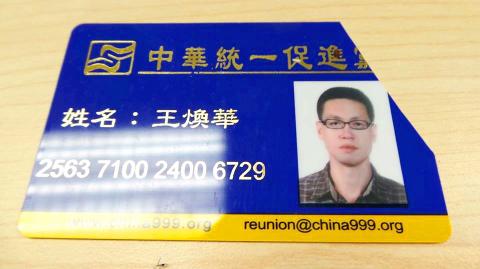Members and former members of the China Unification Promotion Party have been arrested over the past two years for direct involvement in organized crime-related incidents, showing that it may still have strong ties with local organized crime groups, police said.
Founded in 2005 by former leading Bamboo Union member Chang An-le (張安樂), commonly known as “White Wolf” (白狼), the party’s main objective is unification with China.
Chang, who had been on the run in China for more than 17 years, returned to Taiwan in June.

Photo: Facebook
Though it boasts a total membership of close to 20,000, it is not one of the more active political parties. Each party branch is named after a Chinese person of note from antiquity, such as Zilu (子路), one of Confucius’ 72 most renowned disciples, and Yeh Shih (葉適), an official in the Southern Song Dynasty from Wenzhou in Zhejiang Province.
Taoyuan County police department’s criminal investigation division raided the party’s Yeh Shih party headquarters branch early on Wednesday and arrested Wang Huan-hua (王煥華) and four other party members.
The division said that Wang claimed to be the chief of the Yeh Shih branch office, which was located at a local car-washing lot, adding that while he seemed to just be a businessman on the surface, he had used Chang’s support to secure his “turf,” obtain illegal guns and used them to “settle” disputes, and engaged in racketeering across Taipei, Taoyuan and Greater Taichung.
Wang, who had also been on a government list of gang figures to be cracked down on, had met Chang in China in 2010, the division said, adding that Chang had tasked Wang to become the head of the Yeh Shih branch after learning that Wang’s family originated in Wenzhou.
The division also said that Wang had ordered two gang members to rob an art collector surnamed Tseng (曾) in Taipei City after learning that Tseng had various valuable paintings in his house.
The gang members had not succeeded in the attempt, but the Vietnamese girlfriend of Tseng’s son had been pushed from the fourth floor of the building as she was in the process of calling the police during the robbery, the division said.
The police said Wang had also hosted a drug party in June and raped a woman who went by the pseudonym “shuiling” (水靈) who worked at a bar and had also severely beaten her in the bar where she worked, as well as uploading audio files of the rape.
Wang was arrested on Wednesday and sent to Taoyuan District Prosecutor’s Office on charges of organized crime, extortion, obstruction of liberty, obstruction of sexual autonomy and illegal ownership of guns and drugs.
Meanwhile, the China Unification Promotion Party said on Wednesday night that Wang had applied to leave the party in July, which had been approved following his breaking of party regulations.
The announcement, made on Facebook, included an image of Wang’s party membership card with a corner cut off as a sign of its invalidation.
Hsinchu police said that during an anti-crime operation in February last year, one of the prime suspects, You Chia-how (游家豪) had been a deputy director of the China Unification Promotion Party’s Zilu branch.
New Taipei City (新北市) police department said that during a raid on a local Bamboo Union branch they discovered that the union was using the party as a cover, and even handing out party membership cards to absorb students into the gang.
Additional reporting by Chiang Hsiang

Taiwan is stepping up plans to create self-sufficient supply chains for combat drones and increase foreign orders from the US to counter China’s numerical superiority, a defense official said on Saturday. Commenting on condition of anonymity, the official said the nation’s armed forces are in agreement with US Admiral Samuel Paparo’s assessment that Taiwan’s military must be prepared to turn the nation’s waters into a “hellscape” for the Chinese People’s Liberation Army (PLA). Paparo, the commander of the US Indo-Pacific Command, reiterated the concept during a Congressional hearing in Washington on Wednesday. He first coined the term in a security conference last

Prosecutors today declined to say who was questioned regarding alleged forgery on petitions to recall Democratic Progressive Party (DPP) legislators, after Chinese-language media earlier reported that members of the Chinese Nationalist Party (KMT) Youth League were brought in for questioning. The Ministry of Justice Investigation Bureau confirmed that two people had been questioned, but did not disclose any further information about the ongoing investigation. KMT Youth League members Lee Hsiao-liang (李孝亮) and Liu Szu-yin (劉思吟) — who are leading the effort to recall DPP caucus chief executive Rosalia Wu (吳思瑤) and Legislator Wu Pei-yi (吳沛憶) — both posted on Facebook saying: “I

Sung Chien-liang (宋建樑), who led efforts to recall Democratic Progressive Party (DPP) Legislator Lee Kun-cheng (李坤城), was released on bail of NT$80,000 today amid outcry over his decision to wear a Nazi armband to questioning the night before. Sung arrived at the New Taipei District Prosecutors’ Office for questioning in a recall petition forgery case last night wearing a red armband bearing a swastika, carrying a copy of Adolf Hitler’s Mein Kampf and giving a Nazi salute. Sung left the building at 1:15am without the armband and covering the book with his coat. Lee said today that this is a serious

Firefighters are working to put out a fire on Taipei’s Yangmingshan (陽明山) reported earlier this morning. The cause of the fire is still under investigation. The Taipei Fire Department said it received a report of a fire at Xiaoyoukeng (小油坑) at 11:17am, dispatching four command vehicles, 16 firetrucks, one ambulance and 72 personnel. The fire is still burning on about 250m² of land, according to initial estimates, as eyewitnesses reported seeing smoke rising from the mountain. The Yangmingshan National Park Headquarters on Facebook said the Qixingshan (七星山) hiking trail starting from Xiaoyoukeng and the Xiaoyoukeng parking lot are closed as firefighters work to put